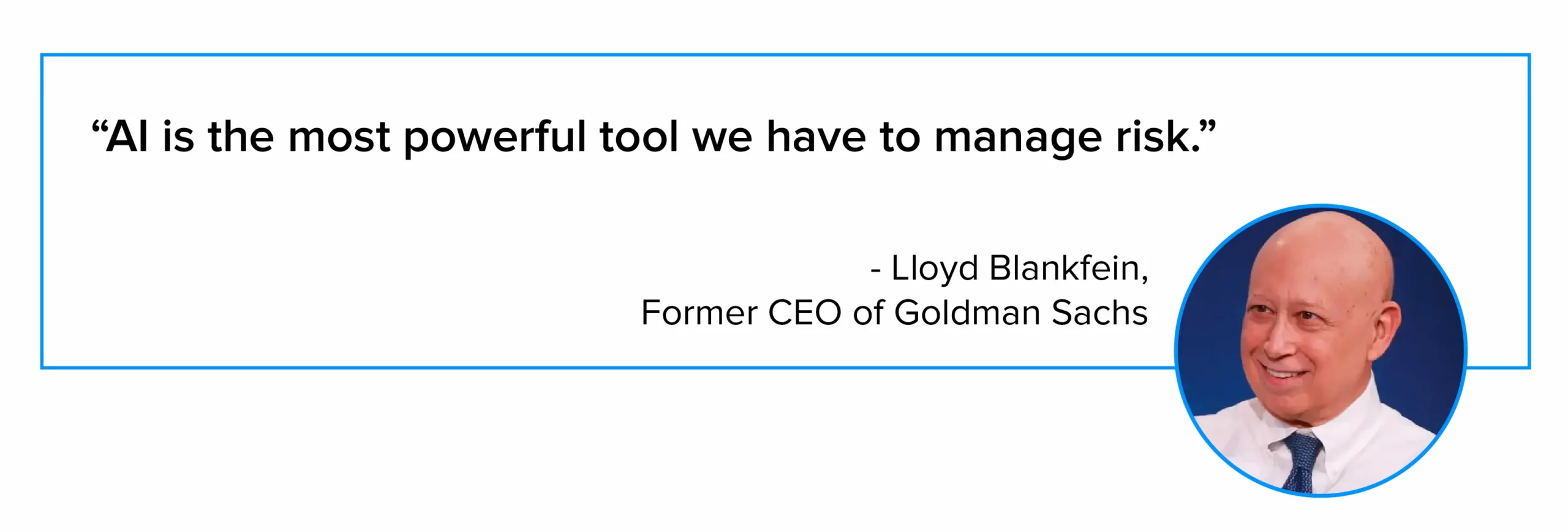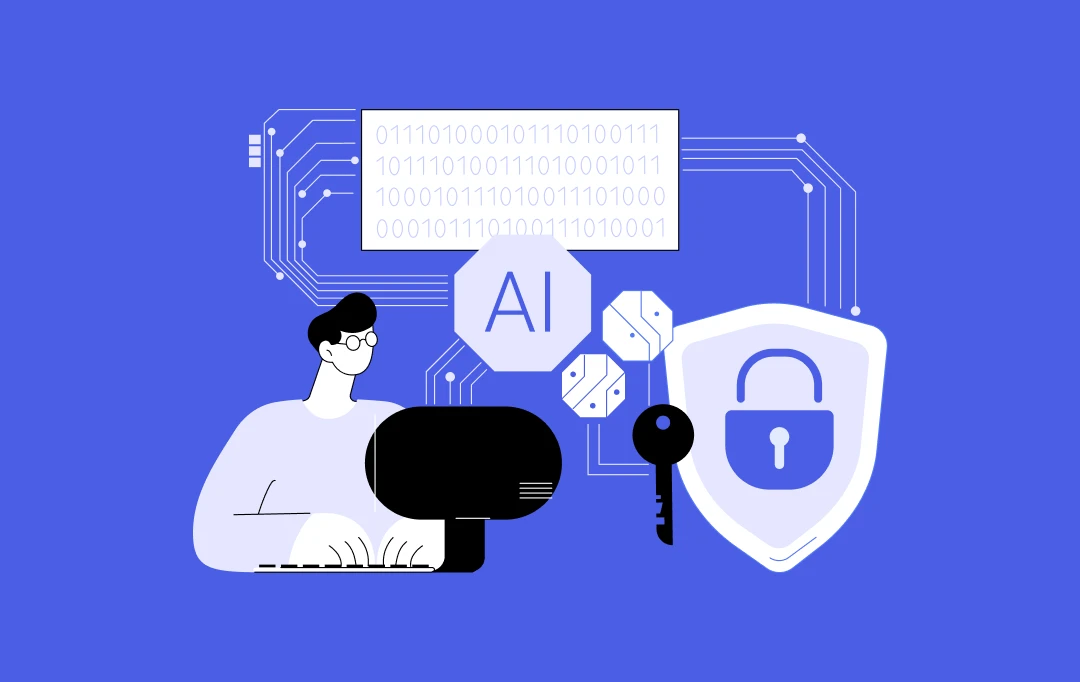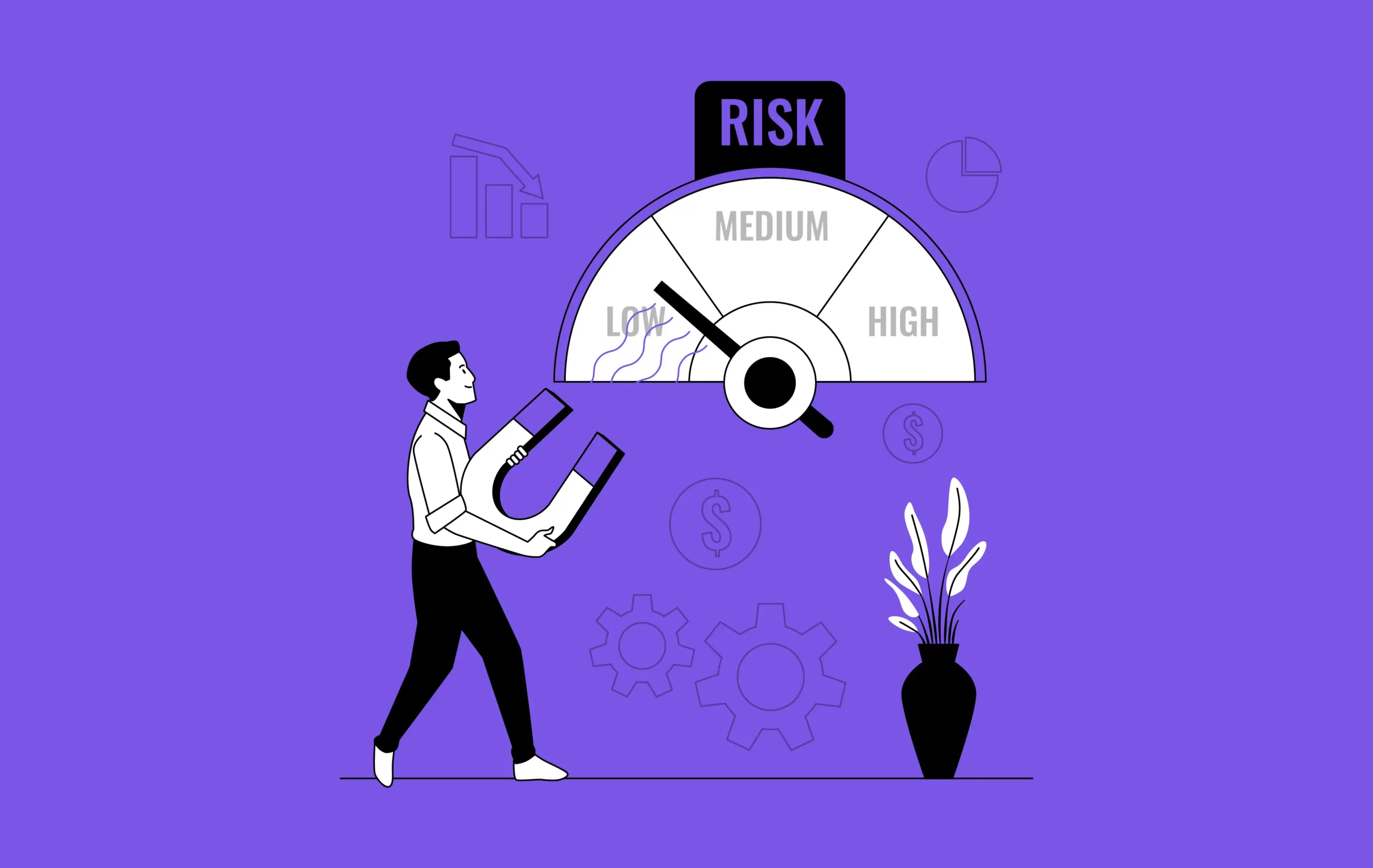- What is the need for AI in Risk Management?
- Use cases of AI in Risk Management
- Fraud Detection and Prevention in Banking
- Credit Scoring and Assessment for Loan Disbursements
- Market Risk Analysis
- Anti-Money Laundering (AML) Compliance
- Cybersecurity Threat Detection
- Supply Chain Risk Prediction
- Drug Safety
- Vehicle Diagnostics
- Risk Management in Insurance
- Customer Churn Prediction
- Predictive Maintenance for Assets in Manufacturing
- Natural Disaster Risk Assessment
- Portfolio Risk Optimization
- Third-Party Vendor Risk Evaluation
- Employee Misconduct Detection
- Future of AI in Risk Management
- How is Appinventiv Shaping the Future of App Development with AI-Powered Risk Management?
- FAQs
The integration of AI in risk management is transforming how businesses predict, analyze, and mitigate various uncertainties. With the application of artificial intelligence for risk management, companies are not just improving efficiency but also enhancing the accuracy of their risk assessment strategies.
According to recent market studies, the AI trust, risk and security management market was valued at $1.7 billion in 2022 and is projected to reach $7.4 billion by 2032, growing at a CAGR of 16.2%. This significant growth underscores the value that AI brings to the table in identifying and managing business risks.
Businesses employing the use of AI-driven risk management strategies can gain a competitive advantage by foreseeing and mitigating potential threats, enhancing decision-making accuracy, and safeguarding their assets and operations. This transformative technology is becoming a vital component in developing strong risk management strategies across industries.
In this blog, we will explore the transformative effects of AI on corporate risk strategies. So, without further ado, let’s jump right into the details.
With the AI risk management market projected to hit $7.4 billion by 2032, make sure your business stays ahead of the curve!
What is the need for AI in Risk Management?
AI-powered risk management systems offer unparalleled benefits, making way for increased efficiency and precision. These sophisticated tools, fueled by artificial intelligence for risk management, are crucial for organizations seeking to identify potential threats and make informed decisions swiftly. AI’s predictive analytics and data-driven insights enable firms to foresee and prepare for a variety of risk scenarios, significantly reducing the likelihood of unexpected setbacks.
Furthermore, the automation of complex risk assessment tasks frees up valuable human resources, allowing teams to focus on strategic decision-making and innovation. By adopting AI, businesses are not only mitigating risks more effectively but are also setting new benchmarks in risk management practices, staying ahead of the curve in a world where uncertainty is a constant.

The integration of AI in risk management processes represents a significant shift towards a proactive approach. It enables businesses to anticipate and handle risks efficiently, contributing to operational resilience, strategic planning, and sustained growth. Ongoing advancements in AI-driven risk management systems promise to revolutionize how businesses navigate challenges, creating a stable and secure operational landscape for the future.
Use cases of AI in Risk Management
Here are the practical applications that illustrate the versatility of artificial intelligence for risk management. These use cases exemplify how AI can transform traditional risk assessment and control.
Fraud Detection and Prevention in Banking
AI in risk management has become an essential tool for banks to combat fraud. By implementing AI-driven risk management solutions, financial institutions can monitor and analyze every transaction with meticulous precision. Consider a scenario where AI algorithms detect irregular spending on a customer’s credit card—a sharp increase in expenditure or a purchase in an unusual location.
The system flags this as potential fraud and instantly alerts the security team, who can then take the necessary steps to verify the transaction’s legitimacy and protect the customer’s assets. The advantage of AI lies in its ability to learn from each interaction, continuously updating its algorithms to identify emerging fraudulent patterns.
As a result, banks can stay ahead of scammers, reducing not only the incidence of fraud but also enhancing customer trust and financial security. This proactive approach has fundamentally reshaped the landscape of financial risk management.
Credit Scoring and Assessment for Loan Disbursements
AI in risk management has become a game-changer in the realm of credit scoring for loan disbursements. Financial institutions are increasingly relying on AI-driven risk management to evaluate loan applications more accurately. These AI systems delve into a wealth of data, scrutinizing transaction histories, savings patterns, and broader financial behaviors. For instance, an AI might examine an individual’s cash flow stability, highlighting consistent savings as a sign of financial health.
Additionally, AI can incorporate non-traditional data, like bill payment histories or online purchasing behaviors, providing a fuller picture of creditworthiness. This depth of analysis enables lenders to identify responsible borrowers who may have been underserved by conventional scoring models. By capturing these nuances, AI helps lenders mitigate risk and make informed decisions about loan approvals.
The impact of AI extends to potential borrowers, offering a fairer assessment for those with less conventional financial histories. It’s a step towards more inclusive financial services, broadening the scope of who may receive loans.
Market Risk Analysis
AI-powered risk management is reshaping market risk analysis. By employing the use of AI in risk management, financial analysts can predict market volatility more accurately. AI algorithms process vast market data, detecting subtle patterns that humans may overlook.
For example, AI can analyze social media trends to forecast market shifts. This can alert investors to potential downturns or opportunities, influencing trading strategies. With risk management using AI, firms can respond to market changes swiftly, reducing potential losses.
AI’s ability to crunch large datasets translates into a deeper understanding of market dynamics. Investment firms benefit from AI’s insights, gaining a competitive edge. They can anticipate risks and adapt portfolio strategies accordingly. AI’s real-time analysis means faster, more informed decisions, which is key in volatile markets. This technology is indispensable for modern financial risk management strategies.
Anti-Money Laundering (AML) Compliance
The AI application in risk management has significantly enhanced Anti-Money Laundering (AML) efforts. Financial institutions utilize AI to scrutinize transaction patterns for suspicious activities. An example is AI identifying irregular large transfers from high-risk jurisdictions like tax havens. Such detection prompts immediate investigation, aligning with AML regulatory requirements.
The role of AI in risk management, especially in AML, is to improve the accuracy and speed of detection. It assesses client profiles against global databases for potential risk indicators. AI systems also continuously learn and adapt to new money laundering methods. This adaptability is key for staying ahead of sophisticated laundering tactics.
AI in enterprise risk management for AML extends to customer due diligence. It automates background checks, reducing onboarding time while ensuring compliance. AI’s real-time monitoring supports ongoing due diligence, which is vital for AML compliance. Firms, thus, maintain integrity and avoid hefty regulatory fines. In essence, AI acts as a tireless sentinel, safeguarding financial institutions against money laundering risks.
Cybersecurity Threat Detection
The use of AI in risk management is particularly impactful in detecting cybersecurity threats. AI systems are trained to monitor network traffic and spot unusual patterns that may indicate a breach. For instance, an AI might detect multiple failed login attempts from a foreign IP address, signaling a potential security threat.

With AI in risk management, companies can quickly isolate and neutralize such threats. The AI system can automatically trigger defensive protocols, such as blocking the suspicious IP address. This rapid response is crucial in preventing data breaches or further infiltration.
AI tools are also adept at recognizing malware and ransomware signatures. They compare network activities against known threat databases for instant identification. This proactive surveillance is essential for maintaining cybersecurity in an ever-evolving threat landscape.
By leveraging AI, businesses can protect their digital assets more effectively. AI’s continuous learning capability means it gets smarter with each detected threat, enhancing future security measures.
Supply Chain Risk Prediction
In the complex arena of supply chains, risk management using AI is a vital tool for predicting disruptions. AI analyzes data across the supply network to foresee potential bottlenecks. For example, it can predict delays from a supplier based on historical performance data and current events.
This technology can also detect fluctuations in demand by analyzing market trends and consumer behaviors. Such insights enable companies to adjust their production and inventory accordingly. For example, AI might anticipate a surge in demand for certain products during the holiday season.
AI models can also monitor social and news trends for early signs of disruption. This includes identifying geopolitical events that could impact logistics. By doing so, companies can adjust their strategies proactively to mitigate risks.
AI’s predictive power means companies can manage inventory more efficiently, reducing both shortages and overstock. As a result, businesses can ensure continuity, customer satisfaction, and robust bottom lines.
Drug Safety
AI application in risk management is revolutionizing drug safety in the pharmaceutical industry. By analyzing complex datasets, AI identifies potential adverse drug reactions before they reach critical levels. For example, AI can examine patient records to spot uncommon side effects across populations taking certain medications.
Artificial intelligence for risk management examples in the pharma sector include predicting patient suitability and trial outcomes. AI might predict which trial participants are at risk of adverse reactions based on genetic markers.
AI can systems track real-world data post-drug release. This ensures ongoing surveillance and safety, detecting risks that weren’t apparent during clinical trials. AI’s predictive analysis is crucial in preventing medical emergencies and ensuring patient well-being.
Pharmaceutical companies can thus navigate drug safety with unprecedented precision. They can address potential issues proactively, ensuring better patient outcomes. AI’s role in drug risk management represents a leap forward in public health and safety.
Vehicle Diagnostics
AI in risk management plays a pivotal role in vehicle diagnostics. AI systems analyze data from vehicle sensors to predict mechanical failures before they occur. For instance, AI can alert a potential engine malfunction due to abnormal temperature readings.
The proactive alerts provided by artificial intelligence for risk management prevent accidents and reduce maintenance costs. By predicting tire wear from driving patterns, AI advises on optimal replacement times. This helps avoid blowouts and maintains vehicle safety standards.
AI also monitors battery life by analyzing charge cycles and usage. It recommends battery servicing to prevent unexpected failures. The technology’s precision in predicting part failures enhances road safety and vehicle reliability.
With AI in risk management, fleet operators optimize maintenance schedules, improving vehicle uptime. Ultimately, AI enhances the safety and longevity of vehicles through smarter, data-driven diagnostics.
[Also Read: How is AI Transforming the Future of the Automotive Industry? Benefits and Use Cases]
Risk Management in Insurance
AI-powered risk management is transforming the insurance sector by enhancing underwriting and claims processing. AI evaluates risks more accurately by sifting through vast datasets. It identifies patterns indicating higher risk profiles, which inform underwriting decisions. For example, AI might assess a driver’s risk by analyzing their driving history, vehicle type, and even social data.
In claims processing, AI speeds up the assessment of damage through image recognition. It quickly estimates repair costs, streamlining claim settlements. This rapid processing benefits both insurers and policyholders.
AI also combats fraudulent claims by detecting anomalies that human analysts might miss. It can flag inconsistencies in claim histories or suspicious patterns in submitted documents.
Through these applications, AI is making insurance more efficient and reliable. Insurers can offer more competitive premiums and personalized policies to individual risk profiles. This targeted approach is redefining the industry standard for risk management.
Customer Churn Prediction
The use of AI in risk management is particularly effective for customer churn prediction. By analyzing customer engagement and satisfaction data, AI identifies patterns that indicate a risk of churn. For instance, a decrease in product usage or service interactions may signal a customer’s intent to leave.
AI algorithms can also process feedback and support tickets to gauge customer sentiment. Negative sentiment can trigger retention strategies to prevent churn. Additionally, purchase history analytics predict when customers might need incentives or engagement.
For subscription services, AI evaluates renewal probabilities. It analyzes behavioral data, like login frequency, to foresee cancellations. By identifying at-risk customers, companies can proactively address concerns and improve retention.
Moreover, AI enhances personalized marketing efforts to re-engage customers. It suggests tailored promotions or content likely to resonate with each customer. This targeted approach is critical in reducing churn and maintaining a loyal customer base.
Predictive Maintenance for Assets in Manufacturing
Predictive maintenance is vital for asset longevity in manufacturing. AI technologies predict equipment failures before they occur. This reduces unplanned downtime and maintenance costs.
For example, sensors collect data on machine performance in real time. AI analyzes this data, detecting anomalies that could indicate pending breakdowns. The technology then schedules maintenance before issues escalate.
By applying risk management using AI, manufacturers can extend the life of machinery. They also avoid the costs associated with emergency repairs. Production schedules become more reliable, and output quality remains consistent.
Artificial intelligence for risk management also plays a vital role in resource allocation. It ensures maintenance resources are used efficiently, based on actual equipment needs. Manufacturers benefit from a more streamlined operation, with AI overseeing the health of their assets.
The proactive approach of predictive maintenance exemplifies AI’s transformative impact. It optimizes the care and management of manufacturing assets, ensuring operational excellence.
Natural Disaster Risk Assessment
Assessing the risk of natural disasters has become more accurate with AI. Advanced algorithms analyze historical weather patterns and current data streams. This analysis provides forecasts that can save lives and reduce economic losses.
With the advent of AI in risk management, agencies predict disaster likelihoods, from floods to wildfires, efficiently. For example, AI systems evaluate satellite imagery and environmental data to foresee wildfires. These systems give firefighters critical information on potential hotspots and spread patterns.
The role of AI in risk management extends to public safety measures. Authorities utilize AI forecasts to plan evacuations and resource deployments. Such preemptive measures are crucial in mitigating the impact of disasters.
AI-driven tools also assist in rebuilding efforts post-disaster. They analyze damage, streamline aid distribution, and contribute to infrastructure planning. This comprehensive approach aids communities in bouncing back more quickly.
AI’s predictive capabilities are redefining disaster risk assessment. They are crucial in preparing for and responding to natural events.
Portfolio Risk Optimization
In finance, balancing risk and return across a portfolio is critical. AI models analyze vast market data, improving investment decisions. These models assess risk in real-time, adjusting portfolios to align with investor goals.
One of the clear Artificial intelligence for risk management examples is asset allocation. AI algorithms process market trends, economic indicators, and company performance. They identify patterns invisible to the human eye, optimizing asset distribution.
For instance, an AI system might foresee a market downturn. It then rebalances the portfolio, shifting to safer assets before the downturn occurs. This preemptive strategy protects the portfolio’s value.
These intelligent systems also simulate various market scenarios. They test how different portfolio compositions might perform under stress. Investors benefit from strategies that have withstood virtual trials of extreme market conditions.
AI tools are becoming indispensable in financial risk management. They empower investors to make informed decisions for portfolio optimization.
Third-Party Vendor Risk Evaluation
Third-party vendor risk evaluation is crucial for business continuity and integrity. AI systems provide dynamic risk assessments, considering performance, compliance, and cybersecurity. They continuously monitor vendors, detecting anomalies that may indicate risks, like financial instability or security breaches.
An example is an AI platform that evaluates vendor networks, identifying potential supply chain disruptions. By assessing vendor data against global events and trends, AI anticipates risks that could impact operations.
Large enterprises need to do vendor assessments as they have lots of vendors. AI in enterprise risk management plays a pivotal role by quantifying and prioritizing vendor risks. It enables businesses to mitigate potential threats proactively rather than reactively. For instance, an AI tool can analyze vendor financial health scores, alerting them to risks before they affect the supply chain.
These insights allow companies to make informed decisions on vendor management and risk exposure. With AI’s deep learning capabilities, risk management becomes a strategic driver rather than a compliance necessity. Businesses can maintain robust, secure, and efficient operations, even in a complex network of third-party relationships.
Employee Misconduct Detection
Employee misconduct can be subtle and damaging, often eluding traditional oversight mechanisms. The role of AI in risk management is increasingly recognized in preempting such issues within the workforce. By analyzing patterns in employee behavior, communication, and transactions, AI can flag irregularities that suggest misconduct. For example, AI algorithms process email traffic to detect patterns indicative of intellectual property theft.
These systems track data access and usage, pinpointing unauthorized information retrieval or distribution. AI tools also monitor network activity, highlighting unusual after-hours access or anomalous data transmissions. By setting up a machine learning model, AI identifies potential insider threats based on deviations from normal behavior.
Proactive alerts from AI systems enable timely interventions, preventing potential fraud or data breaches. In this way, AI acts as a continuous, vigilant layer in a company’s risk management strategy. It ensures that employee conduct aligns with corporate policies, safeguarding the company’s assets and reputation.
The use cases of artificial intelligence for risk management highlight AI’s ability to enhance predictive insights and decision-making across various business sectors. They confirm AI’s role as a crucial component in the future of risk management strategies.
Future of AI in Risk Management
The future of AI in risk management looks highly promising. As the technology continues to advance, AI will be capable of becoming rather refined, more predictive, and integrated across various industrial domains. With further innovations, businesses can expect more sophisticated AI models that provide deeper insights and more accurate risk assessments.
Enhanced Predictive Models
Businesses can expect more powerful algorithms and potential integration with quantum computing for more accurate risk predictions.
Real-time Integration with IoT
AI will combine with the Internet of Things for quicker, more precise responses to emerging risks.
Customized Risk Strategies
AI systems will offer tailored risk management solutions for specific industries and companies.
Here are some specific examples of how AI can be expected to be used in risk management in the future:
AI-powered risk dashboards: AI-enabled risk dashboards will offer real-time risk insights, enabling swift identification and response to emerging risks for businesses.
AI-powered risk forecasting: AI will be used to forecast future risks. This information can be used to develop and implement proactive risk management strategies.
AI-powered risk automation: AI will be used to automate many of the tasks involved in risk management, such as data collection, risk assessment, and risk mitigation. This will free up human resources to focus on more strategic tasks.
How is Appinventiv Shaping the Future of App Development with AI-Powered Risk Management?
At Appinventiv, we excel in crafting app solutions that incorporate AI for risk management, enhancing the resilience and intelligence of your business tools. Our AI development services empower your business tools with advanced predictive analytics, real-time risk monitoring, and adaptive decision-making capabilities, ensuring a proactive approach to risk management and fostering operational agility.
Through our innovative approach, we provide our clients with the means to utilize advanced AI capabilities, ensuring their applications are not only cutting-edge but also secure and reliable.
We recently developed an AI-based recruitment app, JobGet, that not only revolutionizes blue-collar job searches but also significantly reduces risks associated with hiring mismatches, saving time and resources for both workers and employers. The app was able to bag $52 million in series B funding.
We also incorporated AI in the banking app of a leading European bank. The client wanted to keep up with the growth and improve the overall customer experience; thus, we empowered them with an AI-powered mobile app to automate their banking processes. The app was capable of 50% of customer service requests through Generative AI chatbots, thus reducing manpower costs by 20%. AI-powered automation further helped in reducing the overall operational risks associated with manual tasks.
Get in touch with our experts to transform your risk management strategies with smart, AI-enabled app solutions.
FAQs
Q. How does AI enhance risk management in businesses?
A. AI enhances business risk management by swiftly analyzing complex data to predict and identify potential risks. It ensures companies can preemptively address threats, improving decision-making and resource allocation.
Q. What advantages does AI offer when integrated into risk management systems?
A. AI offers significant advantages when integrated into risk management systems, such as enhanced decision-making from predictive insights, increased efficiency through process automation, and greater precision in risk detection. It also allows for real-time threat assessments and responses.
Q. What does the future hold for AI in risk management?
A. The future of AI in risk management promises more advanced predictive models and closer integration with real-time data sources like IoT. Expect more tailored risk management approaches, with AI providing customized strategies to effectively combat evolving risks.


Excellence Together

AI Recruiting - How Artificial Intelligence is Revolutionizing Talent Sourcing and Hiring
Artificial Intelligence is fundamentally transforming the recruitment landscape, streamlining processes that traditionally consume significant time and resources. With over 60% of recruiting professionals expressing optimism about AI’s impact on recruitment, the technology's impact on talent acquisition is truly commendable. AI enhances recruitment efficiency by automating routine tasks such as resume screening and initial candidate interactions,…

AI TRiSM - The Framework to Managing Risk, Building Trust, and Securing AI Systems
Artificial intelligence has taken over the modern business landscape by storm with its unparalleled efficiency in automation, analytics, personalization, fraud detection, medical diagnosis, and more, which was previously unimaginable. According to the Forbes Advisor survey, 64% of businesses believe that AI helps in increasing productivity and improving customer relationships, while a significant portion of organizations…








